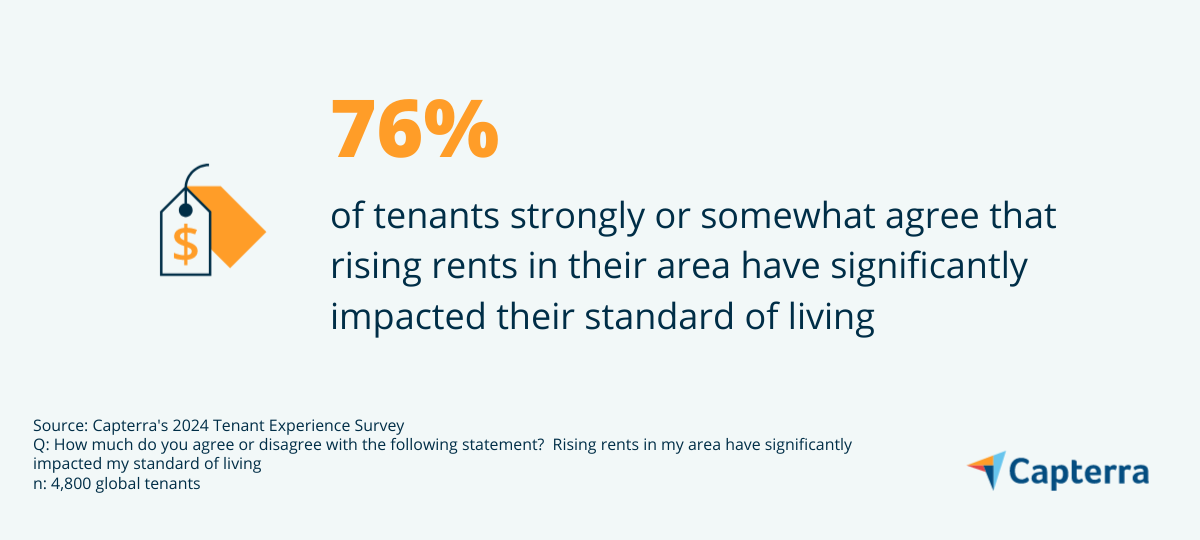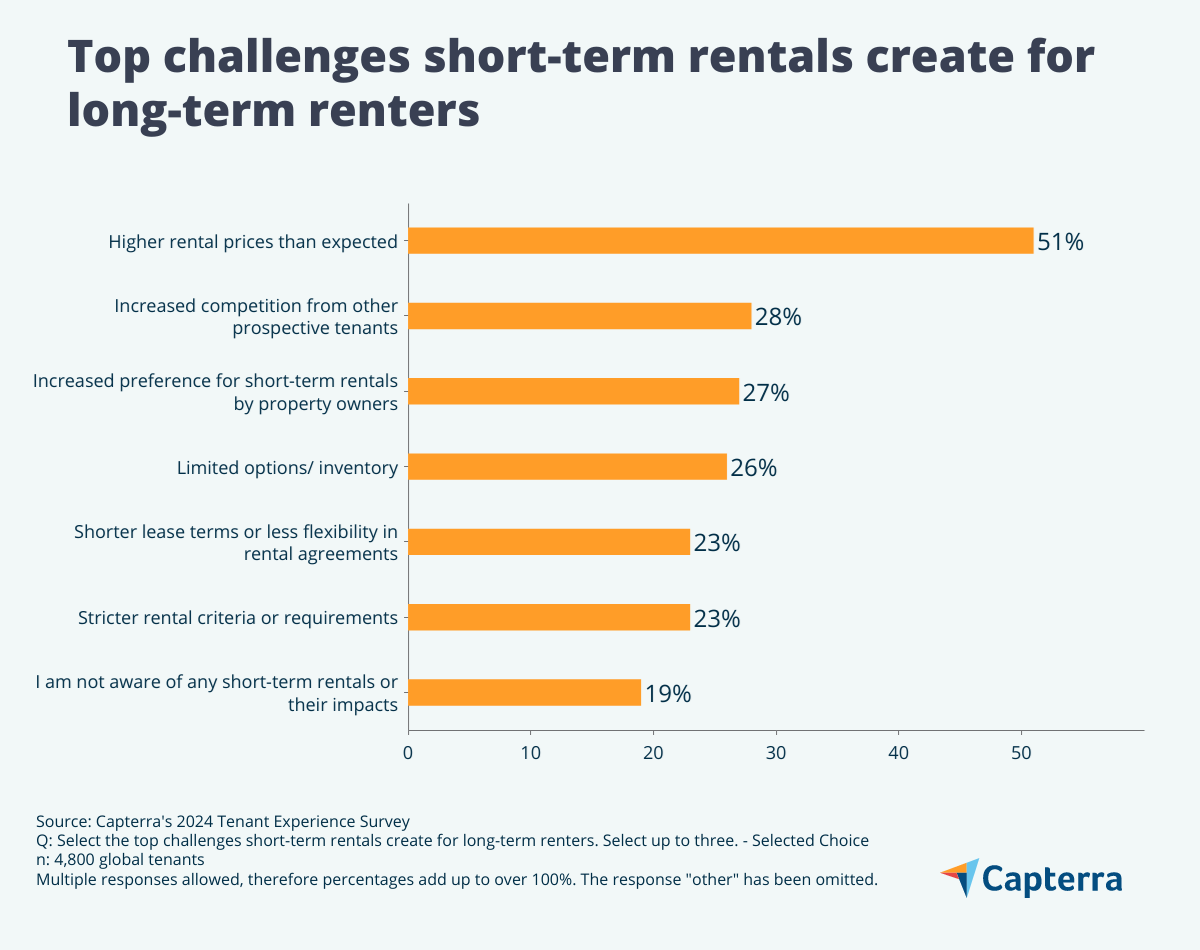The surge in short-term rental platforms has transformed the rental housing market, bringing both benefits and challenges for property managers and tenants. Short-term rentals and rising rents can increase landlords' incomes, but they can also cause neighborhood disruptions and lower living standards and tenant satisfaction. Property management software can help tackle this issue.

In this article
- Over half of tenants are concerned about rising rents due to short-term rentals
- Tenants say rent control and better payment options are the most effective measures to address rent inflation
- Home security and smart technology are property features that can justify higher rental rates
- Tenant-centric communities can deliver long-term rental success
Short-term rentals may provide flexibility and extra income for property owners, but people are raising concerns about their effect on long-term rental availability, affordability, and neighbourhood stability. With more than three-quarters of global tenants feeling that increasing rents have impacted their quality of life, property managers can differentiate themselves by offering competitive rates and appealing technology. This approach can lead to lower tenant turnover and greater tenant satisfaction and loyalty.

To explore these issues, Capterra conducted a global survey in twelve countries, with a total sample of 4,800 tenants, to uncover their experiences and perceptions.* Of this sample, 400 respondents reside in the UK. The results showcase the complexity of factors influencing the current short-term rental market, from rental escalations to neighbourhood disruptions and tenant satisfaction concerns. Moreover, they also show the need for property managers to upgrade their properties and leverage property management tools to elevate the renter experience when external factors are driving prices higher.
- Short-term rentals concern half of tenants: Higher rental prices from short-term rentals are a growing concern for 51% of global tenants and 65% of UK tenants.
- Short-term rentals can influence neighbourhood dynamics: 30% of respondents aware of short-term rentals cite higher noise levels. 29% noticed parking issues, while 24% expressed safety concerns.
- Rent control and tenant-friendly payment options can mitigate inflation damage: Tenants believe that rent control measures (40%) and discounts for on-time payments (30%) are the most effective measures to address inflation.
- Home security and smart tech can justify higher rental prices: 31% of tenants say they would be willing to pay higher rent if home security systems with remote monitoring were included.
Over half of tenants are concerned about rising rents due to short-term rentals
There have been reports indicating that short-term rentals are contributing to rising rental prices in various regions in the UK [1], but does this reflect the experience of surveyed tenants? Over half of respondents globally (51%), and 65% of renters in the UK, view higher rental prices as a direct challenge created by short-term rentals.

But to what extent have they affected rental prices? Of those familiar with the impact of short-term rentals globally, 41% believe they have significantly driven up local rental costs.
These concerns around higher prices underlines the need for property managers to adopt pricing policies that balance profitability with tenant affordability. Property managers should also conduct market analyses to track trends in long-term rental prices that may justify increased rental prices.
Many tenants globally rent rather than buy property because they cannot afford to buy (55%) or because they are currently saving to buy (28%). These numbers are more elevated in the UK, where 81% of tenants are renting because they cannot afford to buy their own real estate.
Pricing issues are a challenge for tenants. Over a third (34%) of respondents globally cite high rental costs as a challenge in their current rental property. Additionally, 36% of globally surveyed tenants express dissatisfaction with the amount of rent they are paying. This number is even higher in the UK, where 43% of tenants are dissatisfied with how much they pay for rent.
Moreover, rent increases have significantly affected tenants globally: 76% strongly or somewhat agree that rising rents in their area have significantly impacted their standard of living.
Given the effects of rising rents from short-term rentals, such as tenant dissatisfaction, it is crucial to build and maintain strong, long-term relationships with tenants. Establishing clear communication and transparent pricing can address concerns, build trust, enhance tenant retention, and reduce turnover.
Property managers should prioritise tenant satisfaction and affordability. Happy tenants are likely to leave positive reviews, which boosts the property manager’s reputation and decreases the number of complaints.
Competition and limited options are additional challenges caused by short-term rentals
Properties that could be available for long-term rentals are more and more frequently being converted to short-term rentals due to the potential for higher income and greater flexibility in managing occupancy rates. This shift can limit the number of properties available for long-term tenants, limiting options for those looking for extended leases.
Over a quarter (26%) of tenants globally identify limited rental options as a key challenge stemming from the prevalence of short-term rentals. And the number is very similar in the UK (25%).
Furthermore, short-term rentals can attract a different demographic, such as tourists or business travelers, compared to long-term rentals. This can lead to increased competition among potential tenants for the remaining long-term rental properties and potentially cause issues when it comes to neighbouthood dynamics.
Noise, congestion, and change to character are some of the effects short-term rentals have on UK neighbourhood dynamics
Financial concerns and availability are key challenges to tenants, but short-term rentals can also affect neighbourhoods in a wider sense.
While 35% of UK respondents who are aware of short-term rentals and their impacts do not cite any notable effect on neighbourhood dynamics, 30% notice more parking congestion and 27% report higher noise levels. Additionally, 25% say that they have noticed changes in neighbourhood character or atmosphere.
Property managers should consider community engagement strategies to build a sense of community and address neighbourhood concerns promptly. Ultimately, tenants who feel well-integrated and satisfied within their community are likely to generate fewer complaints and have longer tenancies.
- Address congestion issues: Push to implement traffic calming measures like speed bumps and improved signage to manage traffic flow. For parking solutions, developing designated resident spots and visitor parking areas can help reduce congestion and prevent overcrowding.
- Minimise noise disturbances: 33% of UK tenants experience noise disturbances in their current rental property. Establish clear noise guidelines and enforce quiet hours to reduce disturbances. Invest in soundproofing measures for common areas and individual units to reduce noise transmission.
- Implement waste management: Contribute to environmental sustainability by implementing energy-efficient practices. Regular rubbish collection schedules and adequate waste disposal and recycling facilities are important.
- Nurture a neighbourhood atmosphere: Engage with residents to maintain the neighbourhood's unique character through beautification projects or historical preservation initiatives. Organising community events and maintaining open communication channels to encourage resident involvement in decisions affecting neighbourhood aesthetics can ensure collective ownership and satisfaction.
- Enhance security measures: Install and maintain security systems, like surveillance cameras and access control. In combination with emergency preparedness plans for critical situations and neighbourhood watch programs, residents can be encouraged to look out for each other’s safety.
- Build a strong community: Collaborate with local stakeholders, including forming partnerships with businesses, organising community service projects, and working with neighbourhood associations. Landlords should also promote diversity and inclusivity while ensuring accessibility.
Tenants say rent control and better payment options are the most effective measures to address rent inflation
Regardless of whether short-term rentals are the cause, rent inflation is a significant concern for tenants. Over half of respondents would find it reasonable for rents to increase between 1% and 10% over the next year. However, 37% cite that rents should not be increased at all.
There are several measures tenants feel can curb rent inflation:

Two out of five global tenants and 60% of UK residents think rent control measures to limit rent increases would be effective. This sentiment reflects growing advocacy for legislative interventions aimed at stabilising rental prices amidst escalating housing costs.
However, beyond legislative measures, property managers can also address demand for actions against rent inflation by considering the following options:
- Longer-term leases may offer more stability and predictability in rental agreements, they can also attract tenants seeking extended stays and minimise turnover costs for owners.
- Tenant-friendly payment options, such as discounts for timely payments and automated or flexible payment structures can encourage prompt rent payments and improve financial management for both tenants and landlords.
- Property managers can stay updated on available subsidy programs and assist tenants in navigating application processes. This support can address tenant endorsement for government-backed financial aid or rental subsidies while fostering a supportive environment that enhances tenant retention.
- Landlords should maintain open communication with tenants regarding rental policies and justifications for rental adjustments. By providing advance notice of impending rent changes, landlords can improve transparency in property management practices.
- By investing in energy-efficient upgrades such as LED lighting or smart thermostats, property owners can attract tenants willing to pay higher rents for sustainable living options and also reduce operational costs over time.
Home security and smart technology are property features that can justify higher rental rates
Understanding tenant preferences for property features is crucial for property managers aiming to attract and retain tenants in competitive rental markets. Investing in desirable amenities can justify higher rental rates and attract tenants willing to pay a higher rent. Even though three in ten tenants globally do not consider that added features can justify paying a higher rent, features like home security systems, and smart systems and appliances are particularly valued by some renters.

To meet demands for advanced security, property managers should install security systems and prominently feature them during property tours and marketing materials, emphasising tenant safety as a key selling point.
Likewise, the interest in smart home automation systems and appliances should encourage property managers to integrate smart devices like automated lighting and locks and upgrade their rental units with energy-efficient appliances that can reduce utility costs.
Tenant-centric communities can deliver long-term rental success
For landlords, considering tenant preferences can enhance relationships with renters, improve reputation, and strengthen long-term business prospects. In a competitive housing market, this approach provides an edge over larger players and helps build a positive reputation.
To address the challenges of short-term rentals and rent inflation, property managers should focus on affordability, community engagement, and technological upgrades. Utilising property management tools can streamline these efforts, helping to mitigate the adverse impacts of short-term rentals and also cultivating a rental community that meets the diverse needs of modern tenants.
UK property managers need to align with tenant preferences and address concerns related to rent inflation through smart features that can save money and enhance security. This way, they can improve tenant satisfaction, reduce turnover rates, and maintain a competitive edge in the rental market.
Survey methodology
*Capterra's 2024 Tenant Experience Survey was conducted in June 2024 among 4,800 respondents in the UK. (n=400), Canada (n=400), India (n=400), Brazil (n=400), Mexico (n=400), the US (n=400), France (n=400), Italy (n=400), Germany (n=400), Spain (n=400), Australia (n=400), and Japan (n=400). The goal of the study was to identify the pain points tenants face and explore software solutions property managers can use to address them. Respondents were screened to currently rent their primary residence. For the 400 UK respondents, candidates had to be UK residents over the age of 18.
Sources
